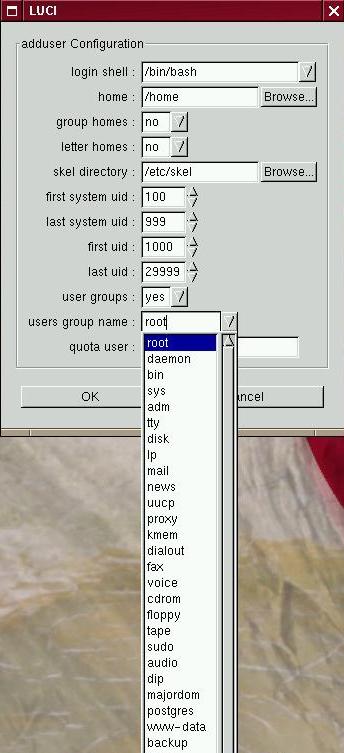
# See adduser(8) and adduser.conf(5) for full documentation.
# The DSHELL variable specifies the default login shell on your
# system.
DSHELL=/bin/bash
# The DHOME variable specifies the directory containing users' home
# directories.
DHOME=/home
# If GROUPHOMES is "yes", then the home directories will be created as
# /home/groupname/user.
GROUPHOMES=no
# If LETTERHOMES is "yes", then the created home directories will have
# an extra directory - the first letter of the user name. For example:
# /home/u/user.
LETTERHOMES=no
# The SKEL variable specifies the directory containing "skeletal" user
# files; in other words, files such as a sample .profile that will be
# copied to the new user's home directory when it is created.
SKEL=/etc/skel
# FIRST_SYSTEM_UID to LAST_SYSTEM_UID inclusive is the range for UIDs
# for dynamically allocated administrative and system accounts.
FIRST_SYSTEM_UID=100
LAST_SYSTEM_UID=999
# FIRST_UID to LAST_UID inclusive is the range of UIDs of dynamically
# allocated user accounts.
FIRST_UID=1000
LAST_UID=29999
# The USERGROUPS variable can be either "yes" or "no". If "yes" each
# created user will be given their own group to use as a default, and
# their home directories will be g+s. If "no", each created user will
# be placed in the group whose gid is USERS_GID (see below).
USERGROUPS=yes
# If USERGROUPS is "no", then USERS_GID should be the GID of the group
# `users' (or the equivalent group) on your system.
USERS_GID=100
# If QUOTAUSER is set, a default quota will be set from that user with
# `edquota -p QUOTAUSER newuser'
QUOTAUSER=""
